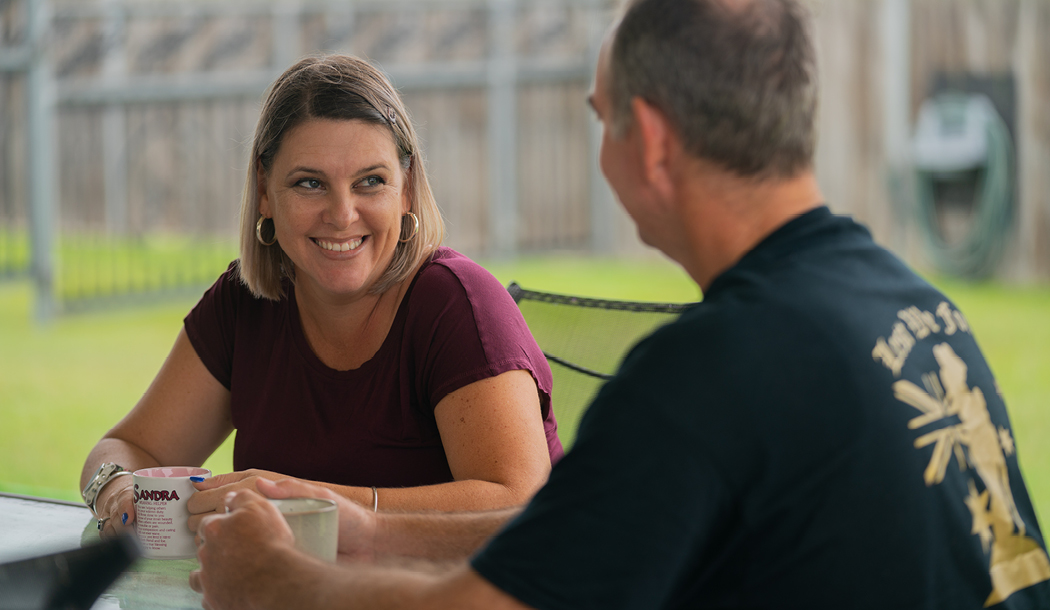Sandra and Rick
A genuine need — Sandra and Rick's story
It’s a tough world when you’re a little person. And it’s so much harder if you don’t have a family to support you.
Sandra and Rick had been married for 15 years with two beautiful children of their own when they decided to open their home to kids in need.
“Just the knowledge of there being kids out there who need a home and stability and love was the drawcard for me,” Sandra reveals.
Having grown up with a foster sibling herself, Sandra was familiar with the idea of a non-traditional family structure, so it felt natural for her to step into the role of second-generation foster carer.
“My parents were carers for a friend of mine in high school who didn’t feel she was in a safe situation at home,” Sandra explains. “She was with us until she aged out of care and decided to move out and go to TAFE.”
“I was an only child previously, and it made me realise there’s more than just 'normal' families out there and it opened my eyes to different experiences. As an adult, I could reflect on the need for children to have that level of safety and comfort — and I could provide that.”
Rick also had some experience with the foster system having grown up in a kinship arrangement with his grandmother. While this made him want to pay homage to his Nana, he was initially hesitant about taking the leap to become a carer himself.
“I was pretty apprehensive, to be honest, because there are so many hoops you need to jump through to get to this stage we are at now. I was worried ‘would I love the child?’, and I didn’t want the foster children to feel neglected because my biological kids were still at home,” Rick admits.
“It’s rewarding when you give a part of yourself and get to see the child take it on.
“Anything you give to them; it lights them up.”
Now a decade later, Sandra and Rick couldn’t imagine their lives without the joys and challenges of having extra kids around the house.
“Over the last 10 years we’ve had 31 placements,” Sandra says.
“We started out wanting to help reunify families, but the path led us in a different direction and we’ve ended up in a position where we have the permanent placement of children with us.”
With an amused smile, she reminisces about the initial light-bulb moment her biological son shared about one child placed in the family’s care.
“Our son was a little bit mind-blown; he was about 15 when we got a child placed with us who was under two and didn’t know how to play. He looked at a toy car as if it were a brick — he had no idea how to make car noises,” she reflects.
“Just the look on this little child’s face watching my 15-year-old play with toys on the floor and learning to play for the first time. It opened my 15-year-old’s eyes as to why we were really doing this — that it’s not just about the fun and the noise; there’s a genuine need.”
The importance placed on family ties is something the couple carry into their care.
“We acknowledge the kids’ right to know their family, wherever possible — it’s very important that they have contact. It’s important for their self-esteem, for their sense of self,” she says.
“You need to do everything you can to make sure they know where they’re from, and who cares about them.
“Some parents don’t have the capacity to provide these things, and it doesn’t mean they don’t love their children. We can be a team, and together give the children all of the support they need to be fulfilled.”
Placements are challenging but rewarding.
“Some of these kids have huge challenges and it’s lots of work to get through it — whether you attend training or take time off work to support them,” says Sandra. “But when they have a victory, the triumph is all the sweeter.”
Rick agrees.
“Look, it’s not easy — nothing is easy. But when it’s not easy, it’s more rewarding,” he says.
“If you’ve got fears of being a foster carer or are afraid to share part of yourself — don’t be. Because whatever you give to the children, you’ll get back ten-fold.
“It might not be straight away— it’s not an instant gratification — but you will get there. It does happen.”
The reward and satisfaction the couple feels because of their foster care adventure is nothing short of exceptional.
“I suppose I’ve really got my wife to thank, because she’s brought something out in me,” Rick says.
“I’ve grown more as a person and I’ve been able to help other children grow as well.”
He reflects on the exhilaration of first fostering a child, knowing the difference you’re able to make by providing a safe and loving home.
“There’s always that nervous energy when you meet a new child,” he says.
“But there’s a little olive branch they’ll extend to you, and you’re offering the branch as well. And it might take a day or a week, but before you know it, you both start to become in-sync and grow together.
“When you look back, you’ll think, wow — I could have done a million things with my time, but what I’ve chosen to do to help these children, well money can’t buy that.”

- Last reviewed
- 7 December 2017
- Last modified
- 1 February 2024
 This work is licensed under a Creative Commons Attribution 4.0 International (CC BY 4.0) licence
This work is licensed under a Creative Commons Attribution 4.0 International (CC BY 4.0) licence

